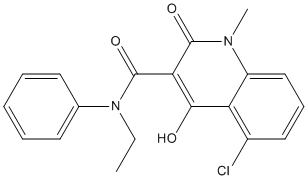All AbMole products are for research use only, cannot be used for human consumption.

Laquinimod (ABR-215062) is a new orally active immunoregulator effectively inhibits development and relapses of experimental autoimmune encephalomyelitis. EAE shares important immunological and clinical features with multiple sclerosis (MS). Doses of 16, 1.6 and 0.16 mg/kg/day laquinimod dose-dependently inhibited disease and showed better disease inhibitory effects as compared to roquinimex (Linomide). Furthermore, laquinimod inhibited the inflammation of both CD4+ T cells and macrophages into central nervous tissues, i.e. the spinal cord. It also changed the cytokine balance in favour of TH2/TH3 cytokines IL-4, IL-10 and TGF-beta.
| Molecular Weight | 356.8 |
| Formula | C19H17ClN2O3 |
| CAS Number | 248281-84-7 |
| Solubility (25°C) | DMSO 70 mg/mL |
| Storage |
Powder -20°C 3 years ; 4°C 2 years In solvent -80°C 6 months ; -20°C 1 month |
| Related Immunology/Inflammation Products |
|---|
| Aloe Polysaccharide
Aloe Polysaccharides are the primary bioactive components of aloe vera gel, primarily found in the gel-like portion of the aloe vera leaf, specifically the transparent, viscous section enclosed by the leaf epidermis. Aloe polysaccharides are a large class of macromolecular compounds with diverse physiological functions, primarily composed of mannose, galactose, glucose, xylose, arabinose, and rhamnose, with mannose, galactose, and glucose being the most abundant. They exhibit various bioactivities, including antibacterial and anti-inflammatory effects, antiviral activity, immune modulation, antitumour properties, radiation protection, antioxidant properties, and hypoglycaemic effects. |
| Terminalia Chebula Extract
Terminalia Chebula Extract is extracted from Terminalia Chebula, which has antioxidant, hepatoprotective, neuroprotective, cytotoxic, antidiabetic, and anti-inflammatory activities. |
| SMS121
SMS121 is a novel CD36 inhibitor. SMS121 reduced the uptake of fatty acid into AML cells that could be reversed by addition of free fatty acids and caused decreased cell viability. |
| Rolistobart
Rolistobart is a humanized immunoglobulin G4-kappa, anti-LILRB4/CD85k monoclonal antibody. |
| Gemtuzumab
Gemtuzumab is a monoclonal IgG4-κ antibody targeting CD33 antigen, which present on leukemic myeloblasts of acute myeloid leukemia (AML). Gemtuzumab can be used for the synthesis of antibody-drug conjugate (ADC) Gemtuzumab ozogamicin. |
All AbMole products are for research use only, cannot be used for human consumption or veterinary use. We do not provide products or services to individuals. Please comply with the intended use and do not use AbMole products for any other purpose.


Products are for research use only. Not for human use. We do not sell to patients.
© Copyright 2010-2024 AbMole BioScience. All Rights Reserved.
